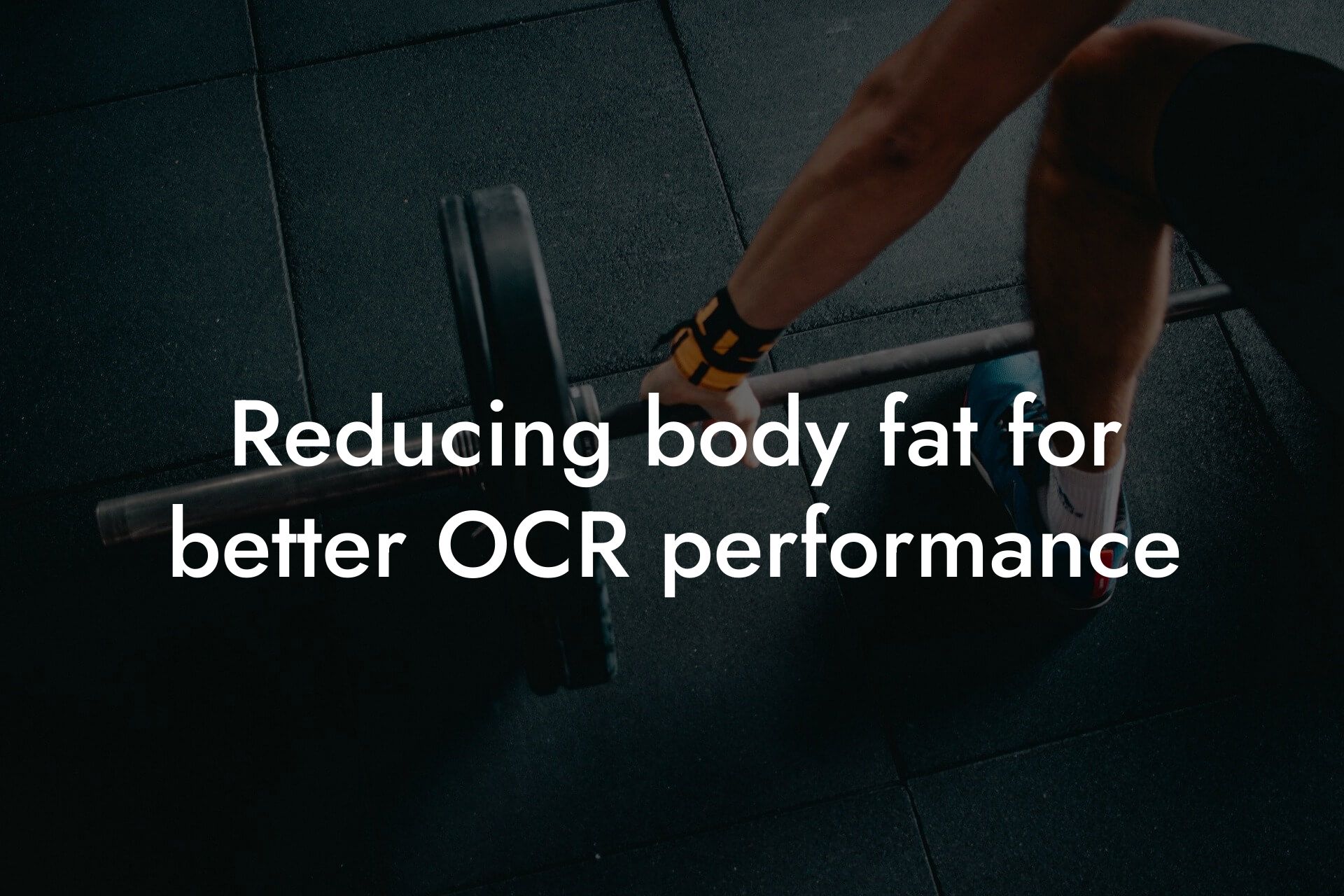As an obstacle course racing (OCR) athlete, you understand the importance of having sustained energy levels throughout your event. A well-planned nutrition strategy can make all the difference in your performance, helping you power through challenging obstacles and cross the finish line strong. In this article, we'll delve into the key nutrition strategies to optimize your energy levels and enhance your overall OCR performance.
Table of Contents
Understanding Energy Systems
Before we dive into nutrition strategies, it's essential to understand how your body uses energy during OCR events. There are three primary energy systems: the phosphocreatine system, the glycolytic system, and the oxidative system. The phosphocreatine system provides immediate energy for short, intense efforts, while the glycolytic system kicks in for moderate-intensity efforts lasting several minutes. The oxidative system, which relies on oxygen, is responsible for sustained energy production during longer events.
Macronutrient Balance
A balanced diet consisting of carbohydrates, protein, and healthy fats is crucial for sustained energy during OCR events. Carbohydrates are the primary source of energy for high-intensity efforts, while protein helps with muscle repair and recovery. Healthy fats provide sustained energy and support hormone production. Aim for a daily macronutrient breakdown of:
- Carbohydrates: 2-3 grams per kilogram of body weight
- Protein: 1.2-1.6 grams per kilogram of body weight
- Healthy fats: 0.5-1 gram per kilogram of body weight
Hydration and Electrolytes
Adequate hydration is critical for energy production and athletic performance. Aim to drink at least 8-10 glasses of water per day, and make sure to include electrolyte-rich beverages or snacks in your diet. Electrolytes, such as sodium, potassium, and magnesium, help regulate fluid balance and nerve function. Include electrolyte-rich foods like bananas, avocados, and nuts in your diet, and consider adding electrolyte supplements or tablets to your hydration plan.
Pre-Event Nutrition
In the 24-48 hours leading up to your OCR event, focus on carbohydrate loading to maximize glycogen stores. Include complex carbohydrates like whole grains, fruits, and vegetables in your diet, and avoid heavy meals or rich foods that can cause digestive discomfort. Aim for a balanced meal with a moderate amount of protein and healthy fats 2-3 hours before the event.
In-Event Nutrition
During the event, aim to consume 30-60 grams of carbohydrates per hour to maintain energy levels. Opt for easily digestible foods like energy gels, chews, or sports drinks that provide a quick source of energy. Avoid heavy meals or rich foods that can cause digestive discomfort during the event.
Post-Event Nutrition
After the event, focus on replenishing energy stores and supporting muscle recovery. Consume a balanced meal with a mix of carbohydrates and protein within 30-60 minutes of finishing the event. This can include foods like bananas with peanut butter, energy bars, or a protein shake with fruit. Aim to consume 1-1.5 grams of protein per kilogram of body weight within the first hour after the event.
Supplementation and Ergogenic Aids
Certain supplements and ergogenic aids can help enhance energy production and athletic performance. Beta-alanine, creatine, and branched-chain amino acids (BCAAs) are popular supplements among OCR athletes. However, always consult with a healthcare professional or registered dietitian before adding any new supplements to your regimen.
Individualized Nutrition Planning
Every athlete is unique, and what works for one person may not work for another. Consider consulting with a registered dietitian or sports nutritionist to develop a personalized nutrition plan tailored to your specific needs and goals. They can help you optimize your macronutrient balance, hydration plan, and supplementation strategy to ensure you're performing at your best.
In conclusion, a well-planned nutrition strategy is essential for sustained energy during OCR events. By understanding your energy systems, balancing your macronutrients, staying hydrated, and fueling your body with the right foods and supplements, you can optimize your performance and reach your goals. Remember to stay flexible and adjust your nutrition plan as needed, and don't hesitate to seek professional guidance to take your performance to the next level.
Frequently Asked Questions
What is OCR and why is nutrition important for it?
OCR stands for Obstacle Course Racing, a physically demanding sport that requires a combination of endurance, strength, and agility. Nutrition plays a crucial role in OCR as it provides the energy and nutrients needed to power through challenging courses and obstacles. A well-planned nutrition strategy can help OCR athletes optimize their performance, delay fatigue, and recover quickly.
What are the key nutrients required for OCR performance?
The three main macronutrients - carbohydrates, protein, and fat - are essential for OCR performance. Carbohydrates provide energy, protein helps with muscle repair and recovery, and fat is a secondary source of energy. Additionally, OCR athletes also require adequate hydration, electrolytes, and micronutrients like vitamins and minerals to support optimal performance.
How do I determine my individual calorie needs for OCR events?
To determine your individual calorie needs, consider factors like your body weight, activity level, and the duration and intensity of the OCR event. A general rule of thumb is to consume 250-300 calories per hour of exercise. However, this can vary depending on individual factors, so it's best to experiment and find what works best for you.
What is the best source of carbohydrates for OCR athletes?
Complex carbohydrates like whole grains, fruits, and vegetables are ideal for OCR athletes. These sources provide sustained energy, fiber, and essential nutrients. Additionally, athletes can also consume sports-specific carbohydrates like energy gels, chews, and bars during events.
How much protein do I need for OCR recovery?
Aim to consume 15-20 grams of protein within 30-60 minutes after an OCR event to support muscle recovery and repair. This can come from sources like protein shakes, bars, or whole foods like lean meats, fish, and eggs.
What is the role of hydration in OCR performance?
Proper hydration is critical for OCR athletes as it helps regulate body temperature, transport nutrients, and remove waste products. Aim to drink 17-20 ounces of water 2-3 hours before an event, and 8-10 ounces every 10-15 minutes during the event.
How can I prevent dehydration during OCR events?
To prevent dehydration, make sure to drink water regularly during the event, and consider consuming electrolyte-rich drinks or snacks to replenish lost salts. Additionally, monitor your urine output and color to ensure you're staying hydrated.
What are some common nutrition mistakes OCR athletes make?
Common nutrition mistakes include inadequate carbohydrate loading, insufficient hydration, and poor electrolyte management. Additionally, consuming too much sugar or caffeine can lead to energy crashes and decreased performance.
How can I optimize my nutrition plan for OCR events?
To optimize your nutrition plan, experiment with different foods and hydration strategies during training to find what works best for you. Also, consider consulting with a sports dietitian or nutritionist to create a personalized plan tailored to your specific needs.
What are some healthy snack options for OCR athletes?
Healthy snack options for OCR athletes include fruits, nuts, energy bars, jerky, and trail mix. Look for snacks that are high in carbohydrates, moderate in protein, and low in added sugars and unhealthy fats.
How can I manage my nutrition during long OCR events?
During long OCR events, aim to consume 30-60 grams of carbohydrates per hour, along with electrolyte-rich drinks or snacks. Additionally, consider consuming small amounts of protein and healthy fats to support sustained energy.
What is the importance of post-event nutrition for OCR athletes?
Post-event nutrition is critical for OCR athletes as it helps with recovery, repair, and replenishment of energy stores. Aim to consume a balanced meal or snack with carbohydrates, protein, and healthy fats within 30-60 minutes after the event.
How can I stay fueled during OCR events in hot weather?
In hot weather, it's essential to stay hydrated by drinking electrolyte-rich drinks and consuming snacks that are high in water content like fruits and energy chews. Additionally, consider wearing lightweight, breathable clothing and taking regular breaks in shaded areas.
What are some common nutrition myths in OCR?
Common nutrition myths in OCR include the idea that athletes need to "carb load" by consuming excessive amounts of carbohydrates, or that protein is only necessary for muscle building. It's essential to separate fact from fiction and consult with a qualified healthcare professional or sports dietitian for personalized nutrition advice.
How can I fuel my body for OCR training?
To fuel your body for OCR training, focus on consuming a balanced diet that includes complex carbohydrates, lean protein, and healthy fats. Additionally, make sure to stay hydrated by drinking plenty of water throughout the day.
What are some OCR-specific nutrition products that can help with performance?
OCR-specific nutrition products like energy gels, chews, and bars can provide a convenient source of energy and electrolytes during events. Look for products that are low in added sugars, artificial ingredients, and unhealthy fats.
How can I monitor my body's response to different nutrition strategies?
Monitor your body's response to different nutrition strategies by tracking your performance, energy levels, and recovery. Additionally, pay attention to any gastrointestinal distress, cramping, or other symptoms that may indicate a need to adjust your nutrition plan.
What is the role of electrolytes in OCR performance?
Electrolytes like sodium, potassium, and magnesium play a critical role in OCR performance as they help regulate fluid balance, nerve function, and muscle contractions. Make sure to consume electrolyte-rich drinks or snacks during events to replenish lost salts.
How can I adapt my nutrition plan for different OCR distances and intensities?
Adapt your nutrition plan for different OCR distances and intensities by adjusting your carbohydrate and electrolyte intake. For shorter, more intense events, focus on consuming high-carbohydrate snacks and drinks, while for longer events, focus on consuming more balanced snacks and meals.
What are some nutrition tips for OCR athletes with dietary restrictions?
For OCR athletes with dietary restrictions, focus on consuming whole, nutrient-dense foods that meet your specific needs. Additionally, consider consulting with a sports dietitian or nutritionist to create a personalized plan that takes into account your dietary restrictions.
How can I stay motivated to fuel my body for OCR performance?
Stay motivated to fuel your body for OCR performance by setting specific, achievable goals, and tracking your progress. Additionally, find a support system of like-minded athletes and healthcare professionals who can provide guidance and encouragement.
Here are some related articles you might love...
- The role of body composition in obstacle course racing performance
- Reducing body fat for better OCR performance
- Strength training tips specific to obstacle course racing
- The importance of bone density in OCR performance
- Preventing injuries in obstacle course racing: A comprehensive guide
- Improving agility and strength for obstacle course racing
- Balancing strength, speed, and endurance in OCR training
- Maintaining muscle recovery with OCR training
- Using DEXA scans to monitor progress in obstacle course training
Zak Faulkner
Zak Faulkner is a leading authority in the realm of physical health and body composition analysis, with over 15 years of experience helping professionals optimise their fitness and well-being. As one the experts behind Tano Performance Group, Zak has dedicated his career to providing in-depth, science-backed insights that empower clients to elevate their physical performance and overall health.
With extensive knowledge of DEXA technology, Zak specializes in delivering comprehensive body assessments that offer precise data on body fat, muscle mass, bone density, and overall physique. His expertise enables individuals to make informed decisions and achieve their fitness goals with accuracy and confidence. Zak’s approach is rooted in a deep understanding of human physiology, combined with a passion for helping clients unlock their full potential through personalised strategies.
Over the years, Zak has earned a reputation for his commitment to excellence, precision, and client-focused service. His guidance is trusted by top professionals who demand the best when it comes to their health. Whether advising on fitness programs, nutritional strategies, or long-term wellness plans, Zak Faulkner’s insights are a valuable resource for anyone serious about taking their health and fitness to the next level.
At Tano Performance Group, Zak continues to lead our Content Team revolutionising how professionals approach their physical health, offering unparalleled expertise that drives real results.




